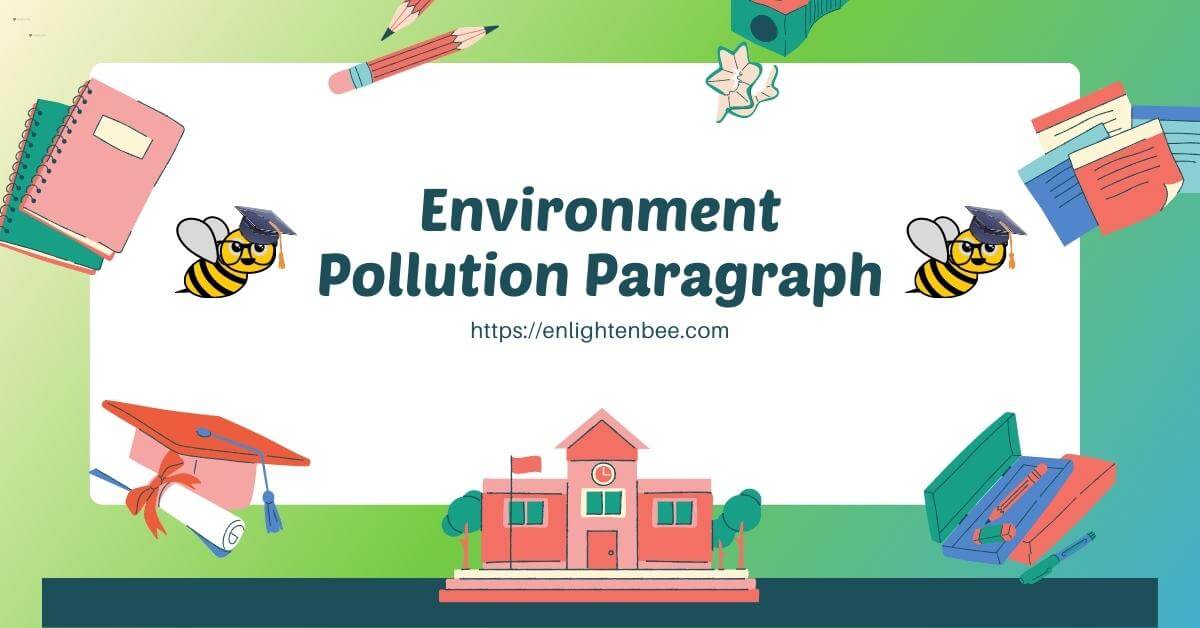1 Environment Pollution Paragraph
Environmental pollution is a significant problem that affects our planet. Pollution refers to the presence of harmful substances in the air, water, or soil. When these substances enter the environment, they can cause damage to plants, animals, and humans. There are various types of pollution, such as air pollution, water pollution, and soil pollution. Air pollution occurs when harmful gases and particles are released into the air, making it difficult to breathe and causing health problems. Water pollution happens when pollutants like chemicals and waste contaminate rivers, lakes, and oceans, making the water dirty and unsafe for living organisms. Soil pollution occurs when chemicals and toxins are present in the soil, hindering plant growth and affecting the food we consume. Some common causes of pollution include industrial activities, vehicle emissions, and improper waste disposal. To reduce pollution, we can take simple steps like using public transport, recycling, and conserving energy. It is essential for everyone to comprehend the impact of pollution on the environment and take action to protect our planet.
Difficult Words for Environment Pollution Paragraph:
- Pollution – দূষণ – The presence of harmful substances in the environment that can cause damage
- Substances – পদার্থগুলি – Materials or matter
- Environment – পরিবেশ – The surroundings or conditions in which living things exist
- Harmful – ক্ষতিকর – Causing damage or injury
- Pollutants – দূষক – Substances that cause pollution
- Industrial activities – শিল্প কার্যক্রম – Activities related to industries
- Vehicle emissions – যানবাহন বিক্রিয়া – Gases and particles released from vehicles
- Improper waste disposal – অযথাযথ পদার্থ নির্মূলন – Incorrect or careless disposal of waste materials
- Conserving energy – শক্তি সংরক্ষণ করা – Using energy wisely and not wasting it
2 Environment Pollution Paragraph
Environmental pollution is a significant and pervasive issue that profoundly affects our planet and all its inhabitants. Pollution refers to the presence of harmful substances in the air, water, or soil, which can have detrimental effects on the delicate balance of our ecosystem. These substances, when introduced into the environment, pose a grave threat to plants, animals, and human beings alike. There exist various types of pollution, including air, water, and soil pollution, each with its own set of consequences. Air pollution arises from the release of harmful gases and particles into the atmosphere, compromising the quality of the air we breathe and leading to a host of health problems. Water pollution occurs when pollutants such as chemicals and waste infiltrate our precious water bodies, rendering them polluted and unsafe for the diverse marine life and those who depend on them. Soil pollution, on the other hand, arises from the presence of toxic chemicals and contaminants in the soil, hindering the growth of plants and impacting the quality of the food we consume. The root causes of pollution are multifaceted and include industrial activities, vehicle emissions, and improper waste disposal practices. To combat pollution, it is crucial that we adopt simple yet effective measures such as utilizing public transportation, promoting recycling, and conserving energy. It is incumbent upon all individuals to grasp the far-reaching implications of pollution on our environment and take proactive steps to safeguard and preserve our planet for future generations.
Difficult Words for Environment Pollution Paragraph:
- Pollution – দূষণ – The presence of harmful substances in the environment that can cause damage
- Substances – পদার্থগুলি – Materials or matter
- Ecosystem – প্রদীপ্তিসংস্থান – A community of living organisms and their interactions with the environment
- Inhabitants – বাসিন্দা – Residents or occupants
- Pervasive – প্রবলভাবে ছড়ানো – Spreading widely or extensively
- Delicate – কোমল – Fragile or easily damaged
- Consequences – ফলাফল – Results or outcomes
- Compromising – সমঝোতামূলক – Endangering or jeopardizing
- Multifaceted – বহুপ্রস্তুতিমূলক – Having many different aspects or facets
- Incumbent – দায়িত্বপ্রাপ্ত – Obligatory or necessary
3 Environment Pollution Paragraph
Environmental pollution is a pressing global crisis that demands immediate attention and concerted efforts from individuals, governments, and industries. It encompasses the contamination and degradation of the natural environment, including air, water, and soil, by harmful substances or pollutants. The consequences of pollution are multifaceted and far-reaching, posing significant threats to human health, biodiversity, and the overall well-being of our planet. Air pollution, caused by the release of pollutants from various sources such as vehicle emissions, industrial activities, and the burning of fossil fuels, not only contributes to respiratory diseases but also exacerbates climate change through the emission of greenhouse gases. Water pollution, resulting from the discharge of industrial waste, agricultural runoff, and improper disposal of chemicals and plastics, has devastating effects on aquatic ecosystems and compromises the availability of clean drinking water. Soil pollution, often caused by the excessive use of chemical fertilizers, pesticides, and improper waste disposal, degrades soil fertility and poses risks to agricultural productivity and food security. Moreover, pollution disrupts the delicate balance of ecosystems, leading to the loss of biodiversity, habitat destruction, and ecological imbalances. To tackle this grave issue, it is imperative to adopt sustainable practices, promote renewable energy sources, implement stricter environmental regulations, and raise awareness about the importance of preserving and safeguarding our environment for future generations.
Difficult words for Environment Pollution Paragraph:
- Degradation: পতন, the deterioration or loss of quality, value, or functionality.
- Multifaceted: বহুমুখী, having many different aspects or facets.
- Biodiversity: জীববৈচিত্র্য, the variety and variability of living organisms in a particular habitat or ecosystem.
- Exacerbate বাড়ানো, to make a problem, situation, or condition worse.
- Runoff: পথনির্দেশ, the flow of water that occurs when excess rainwater or melted snow does not soak into the ground but instead flows over the surface.
- Fertility: উর্বরতা, the quality of being fertile, capable of supporting plant growth or reproduction.
- Imbalances: অসন্তুলন, a lack of balance or proportion; an uneven distribution or arrangement.
4 Environment Pollution Paragraph
Environmental pollution refers to the contamination and degradation of our natural surroundings as a result of human activities. It encompasses a wide range of harmful effects on air, water, soil, and overall ecosystems. The consequences of environmental pollution are far-reaching, impacting both human health and the delicate balance of the planet. Air pollution, caused by the emission of toxic gases and particulate matter from industries, vehicles, and the burning of fossil fuels, leads to respiratory diseases and climate change. Water pollution, caused by the discharge of industrial waste, agricultural runoff, and improper waste disposal, contaminates our water bodies, making them unsafe for drinking and threatening aquatic life. Soil pollution, resulting from the excessive use of chemical fertilizers and pesticides, degrades soil quality, reducing agricultural productivity and harming biodiversity. Additionally, noise pollution, caused by excessive noise from traffic, construction sites, and industrial activities, disrupts ecosystems and affects human well-being. To address these issues, it is crucial to raise awareness, adopt sustainable practices, and implement effective regulations to mitigate and prevent environmental pollution.
Difficult words for Environment Pollution Paragraph:
- Contamination: দূষণ / The act of making something impure or harmful by adding something unwanted or dangerous to it.
- Degradation: অবমূল্যতা / The process of damaging or destroying something, or making it weaker or less effective.
- Ecosystems: প্রাণিসম্পদ / A biological community of interacting organisms and their physical environment.
- Particulate matter: অণুসংকটাকারী বস্তু / Small solid or liquid particles suspended in the air, such as dust, smoke, or soot.
- Runoff: প্রবাহিত পানি / The flow of water from land into rivers, lakes, and other bodies of water.
- Biodiversity: বাসপতিসমৃদ্ধি / The variety of plant and animal life in the world or in a particular habitat or ecosystem.
5 Environment Pollution in Bangladesh Paragraph
Bangladesh, a densely populated country in South Asia, is grappling with severe environmental pollution issues that pose significant challenges to its ecosystem and public health. Rapid industrialization, unplanned urbanization, and inadequate waste management systems have resulted in widespread pollution of air, water, and land.
Air pollution is a major concern in Bangladesh, particularly in its urban areas. The emission of harmful gases from vehicles, industries, and brick kilns contributes to high levels of air pollution, leading to respiratory problems and various other health issues. Additionally, the burning of crop residues and the use of low-quality fuels further exacerbate the problem.
Water pollution is another pressing issue affecting Bangladesh. Industrial effluents, untreated sewage, and agricultural runoff containing pesticides and fertilizers find their way into rivers and water bodies, contaminating the water supply. This contamination not only poses a direct threat to human health but also affects aquatic life and ecosystems, leading to a loss of biodiversity.
Land pollution is a consequence of improper waste disposal and the dumping of hazardous materials. Inadequate waste management systems and a lack of awareness regarding proper waste disposal practices have resulted in the accumulation of solid waste in cities and rural areas. This not only mars the aesthetic appeal of the surroundings but also poses health risks and contributes to the degradation of soil quality.
To address these environmental challenges, Bangladesh needs robust policies and effective implementation strategies. It is crucial to promote sustainable practices, encourages the use of cleaner technologies, and establish stringent regulations for industries and waste management. Furthermore, raising awareness among the general population about the importance of environmental conservation is vital for long-term sustainability.
Difficult Words for Environment Pollution Paragraph:
- Industrialization – শিল্পীকরণ: The process of developing industries on a large scale in a country or region.
- Urbanization – শহরীকরণ: The process of increasing the proportion of people living in urban areas.
- Inadequate – অপর্যাপ্ত: Not enough or not satisfactory; insufficient.
- Ecosystem – বাস্তুতন্ত্র: A community of living organisms in conjunction with the nonliving components of their environment, interacting as a system.
- Effluents – প্রসারিত বা নির্গমিত পদার্থসমূহ: Waste materials, such as liquids or gases, that are discharged from industrial or human activity into the environment.
More Paragraphs
Join Our Community on Facebook.









